新概念英语第1册第一课课文lesson1
- 格式:doc
- 大小:20.50 KB
- 文档页数:1
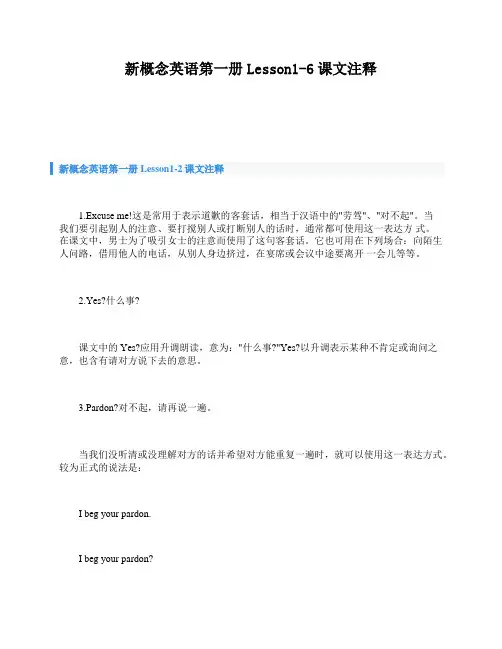
新概念英语第一册Lesson1-6课文注释新概念英语第一册Lesson1-2课文注释1.Excuse me!这是常用于表示道歉的客套话,相当于汉语中的"劳驾"、"对不起"。
当我们要引起别人的注意、要打搅别人或打断别人的话时,通常都可使用这一表达方式。
在课文中,男士为了吸引女士的注意而使用了这句客套话。
它也可用在下列场合:向陌生人问路,借用他人的电话,从别人身边挤过,在宴席或会议中途要离开一会儿等等。
2.Yes?什么事?课文中的 Yes?应用升调朗读,意为:"什么事?"Yes?以升调表示某种不肯定或询问之意,也含有请对方说下去的意思。
3.Pardon?对不起,请再说一遍。
当我们没听清或没理解对方的话并希望对方能重复一遍时,就可以使用这一表达方式。
较为正式的说法是:I beg your pardon.I beg your pardon?Pardon me.它们在汉语中的意思相当于"对不起,请再说一遍"或者"对不起,请再说一遍好吗?"4.Thank you very much.非常感谢!这是一句表示感谢的用语,意为"非常感谢(你)"。
请看下列类似的表达式,并注意其语气上的差异:Thank you.谢谢(你)。
Thanks!谢谢!Many thanks.Thanks a lot.Thanks very much.<口>非常感谢。
5.数字1~10的英文写法1-one 2-two 3-three 4-four 5-five6-six 7-seven 8-eight 9-nine 10-ten新概念英语第一册Lesson3-4课文注释1. My coat and my umbrella please.请把我的大衣和伞伞给我。
这是一个省略形式的祈使句,完整的句子应为:Give me my coat and my umbrella,please.口语中,在语境明确的情况下通常可省略动词和间接宾语,如: (Show me your)Ticket,please.请出示你的票。
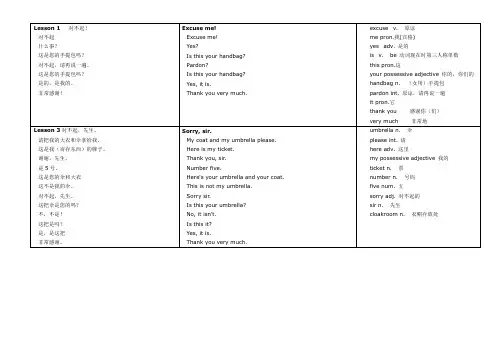
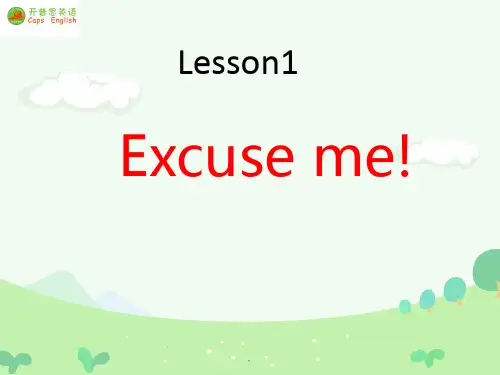
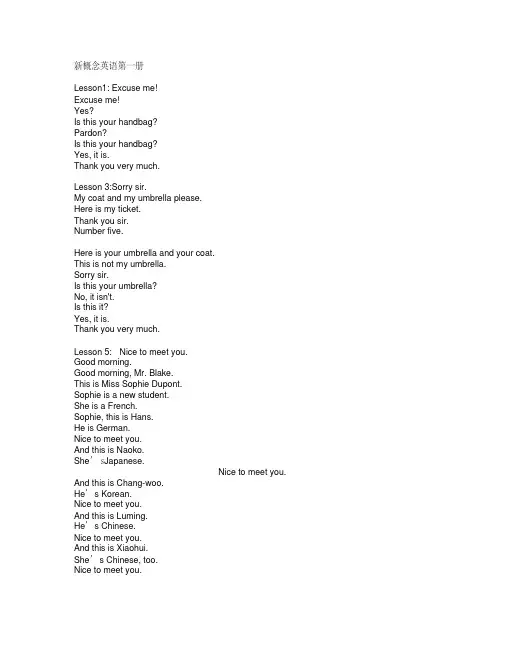
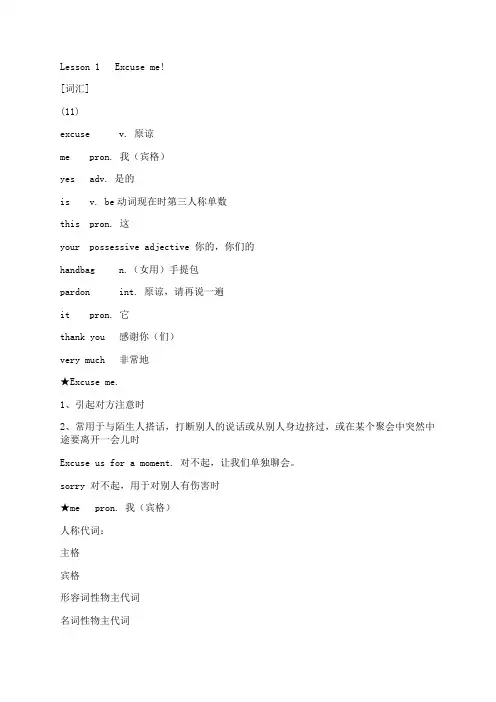
Lesson 1 Excuse meexcuse v. 原谅me pron. 我(宾格)yes adv. 是的is v. be动词现在时第三人称单数this pron. 这your possessive adjective 你的,你们的handbag n.(女用)手提包pardon int. 原谅,请再说一遍it pron. 它thank you 感谢你(们)very much 非常地★Excuse me.1、引起对方注意时2、常用于与陌生人搭话,打断别人的说话或从别人身边挤过,或在某个聚会中突然中途要离开一会儿时Excuse us for a moment. 对不起,让我们单独聊会。
sorry 对不起,用于对别人有伤害时★me pron. 我(宾格)人称代词:主格宾格形容词性物主代词名词性物主代词Imemyminehehimhishissheherherhersitititsitsyouyouyouryours主格:用在句首,作主语宾格:在动词、介词之后形容词性的物主代词:不能单独使用名词性物主代词:只能单独使用★is v. be动词现在时第三人称单数be动词:am、is、areI amshe/ he/ it isyou/ we/ they are★pardon int. 原谅,请再说一遍Pardon?/ I beg your pardon. 请求对方把刚才讲过的话重复一遍。
[语法]含有be动词的陈述句、否定句和一般疑问句含有be动词的任何句子,否定句就是在be动词后面加not;如果变一般疑问句,就把be动词提前到句子的前面。
[课文]Excuse me.Yes?Is this your handbag?Pardon?Is this your handbag?Yes, it is.Thank you very much.Lesson 2 Is this your…?[词汇](10)pen n.钢笔pencil n.铅笔book n.书watch n.手表coat n.上衣,外衣dress n.连衣裙skirt n.裙子shirt n.衬衣car n.小汽车house n.房子★dress① n. 连衣裙;套裙② n. 服装,衣服casual dress 便服evening dress 晚礼服★house n.房子house 房子,一般指独立的院落,更具体的指房子的建筑,结构family 侧重家庭的成员There are four people in my family. 在我家里有四口人。
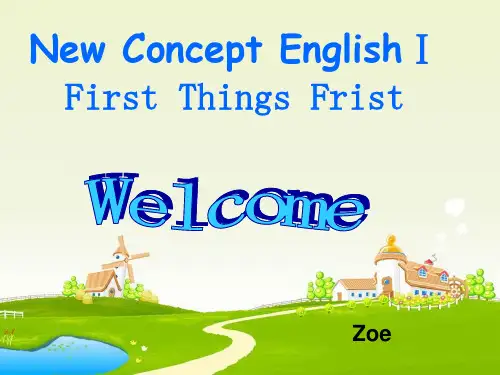
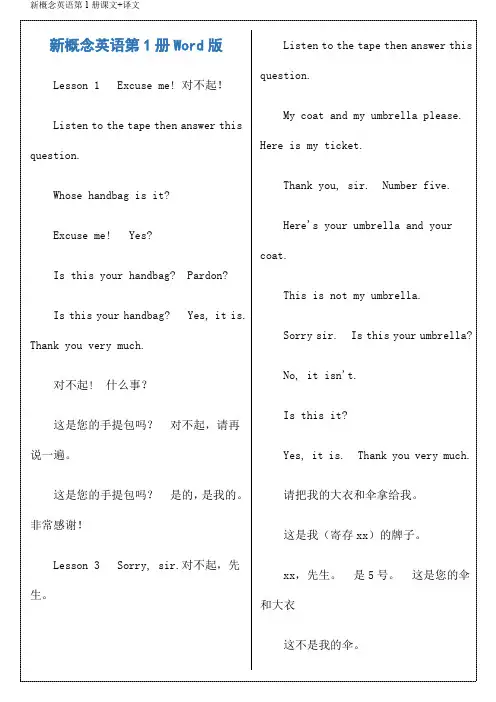
新概念英语第1册Word版Lesson 1 Excuse me! 对不起!Listen to the tape then answer this question.Whose handbag is it?Excuse me! Yes?Is this your handbag? Pardon?Is this your handbag? Yes, it is. Thank you very much.对不起! 什么事?这是您的手提包吗?对不起,请再说一遍。
这是您的手提包吗?是的,是我的。
非常感谢!Lesson 3 Sorry, sir.对不起,先生。
Listen to the tape then answer this question.My coat and my umbrella please. Here is my ticket.Thank you, sir. Number five.Here's your umbrella and your coat.This is not my umbrella.Sorry sir. Is this your umbrella?No, it isn't.Is this it?Yes, it is. Thank you very much.请把我的大衣和伞拿给我。
这是我(寄存xx)的牌子。
xx,先生。
是5号。
这是您的伞和大衣这不是我的伞。
对不起,先生。
这把伞是您的吗?不,不是!这把是吗?是,是这把非常感谢。
Lesson 5 Nice to meet you 很高兴见到你。
Listen to the tape then answer this question.Is Chang-woo Chinese?MR. BLAKE: Good morning.STUDENTS: Good morning, Mr. Blake.MR. BLAKE: This is Miss Sophie Dupont.Sophie is a new student. She is French.MR. BLAKE: Sophie, this is Hans. He is German.HANS:Nice to meet you.MR. BLAKE: And this is Naoko. She's Japanese.NAOKO:Nice to meet you.MR. BLAKE: And this is Chang-woo. He's Korean.CHANG-WOO: Nice to meet you.MR. BLAKE: And this is Luming. He is Chinese.LUMNG:Nice to meet you.MR. BLAKE: And this is Xiaohui. She's Chinese, too.XIAOHUI: Nice to meet you.xx先生:早上好。
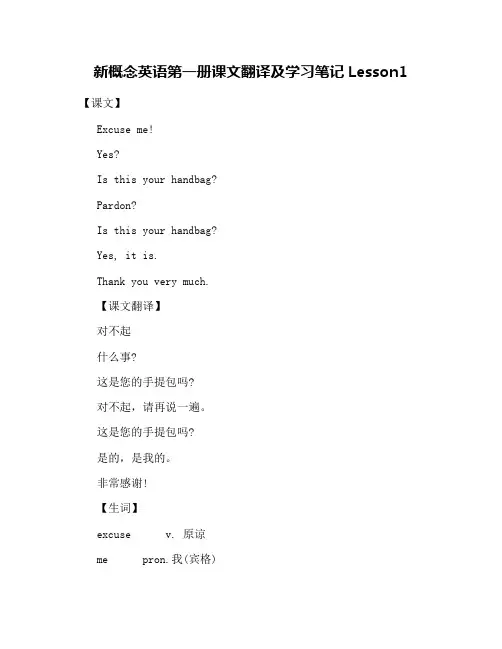
新概念英语第一册课文翻译及学习笔记Lesson1【课文】Excuse me!Yes?Is this your handbag?Pardon?Is this your handbag?Yes, it is.Thank you very much.【课文翻译】对不起什么事?这是您的手提包吗?对不起,请再说一遍。
这是您的手提包吗?是的,是我的。
非常感谢!【生词】excuse v. 原谅me pron.我(宾格)yes adv. 是的is v. be 动词现在时第三人称单数this pron.这your adj. 你的,你们的handbag n. (女用)手提包pardon int. 原谅,请再说一遍it pron.它thank you 感谢你(们)very much 非常地【知识点讲解】1. Excuse me 是一个很常用的词组,通常用来引起对方注意或是搭话。
它的字面意思是“原谅+我”,但一般不用来跟人道歉,道歉还是应该用sorry。
2. 文中的yes有两种意思:其一是有人叫你时,回答对方;其二是表示肯定。
3. pardon本身也是“原谅”的意思,这里的意思是“不好意思我没有听清楚,请再说一遍”。
要对方重复,也能够说"Sorry?"4. Is this your handbag? 这是你的手提包吗?这是疑问句的句型,变成叙述句应该是:This is your handbag. 这是你的包。
5. handbag,一般指女生用的手提包。
钱包是purse,男生的公文包是briefcase。
![《新概念英语》[第1册][课文](1-25课)](https://uimg.taocdn.com/9bbabd51be23482fb4da4c68.webp)
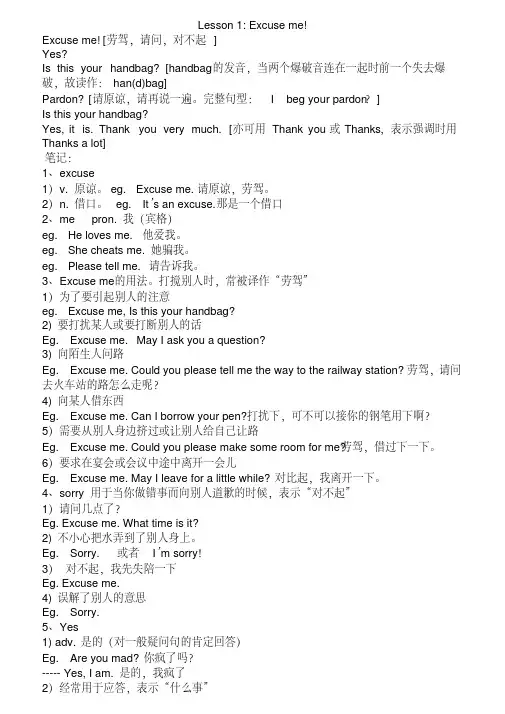
Lesson 1: Excuse me!Excuse me! [劳驾,请问,对不起]Yes?Is this your handbag? [handbag的发音,当两个爆破音连在一起时前一个失去爆破,故读作:han(d)bag]Pardon? [请原谅,请再说一遍。
完整句型:I beg your pardon?]Is this your handbag?Yes, it is. Thank you very much. [亦可用Thank you或Thanks,表示强调时用Thanks a lot]笔记:1、excuse1)v. 原谅。
eg. Excuse me. 请原谅,劳驾。
2)n. 借口。
eg. It’s an excuse. 那是一个借口2、me pron. 我(宾格)eg. He loves me. 他爱我。
eg. She cheats me. 她骗我。
eg. Please tell me. 请告诉我。
3、Excuse me的用法。
打搅别人时,常被译作“劳驾”1)为了要引起别人的注意eg. Excuse me, Is this your handbag?2) 要打扰某人或要打断别人的话Eg. Excuse me. May I ask you a question?3) 向陌生人问路Eg. Excuse me. Could you please tell me the way to the railway station? 劳驾,请问去火车站的路怎么走呢?4) 向某人借东西Eg. Excuse me. Can I borrow your pen? 打扰下,可不可以接你的钢笔用下啊?5)需要从别人身边挤过或让别人给自己让路Eg. Excuse me. Could you please make some room for me? 劳驾,借过下一下。
6)要求在宴会或会议中途中离开一会儿Eg. Excuse me. May I leave for a little while? 对比起,我离开一下。
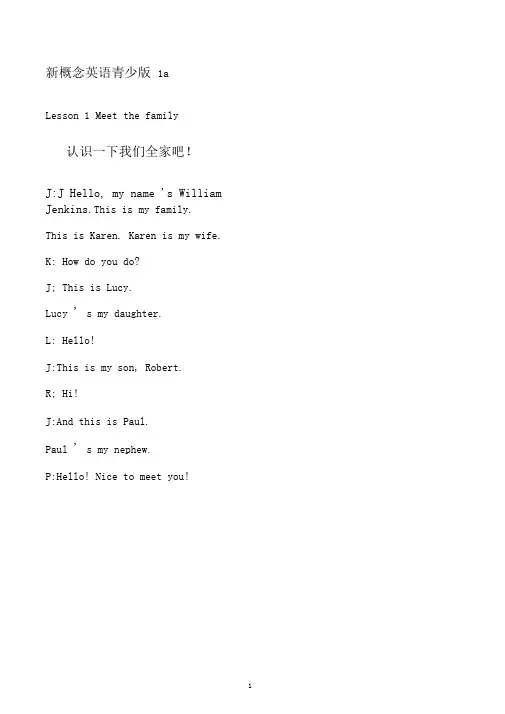
新概念英语青少版1aLesson 1 Meet the family认识一下我们全家吧!J:J Hello, my name 's William Jenkins.This is my family.This is Karen. Karen is my wife.K: How do you do?J; This is Lucy.Lucy ' s my daughter.L: Hello!J:This is my son, Robert.R; Hi!J:And this is Paul.Paul ' s my nephew.P:Hello! Nice to meet you!Lesson 3 What is it?它是什么?Hey! this is good. Look, Lucy!What is this?It ' s a wheel.No, it isn ' t. Look, it !' sItgr'eesna hat!OK, it 's a green hat.Now look. What ' s this?It 's laowf er. I t's a redlofwer.No, it isn t. it s a red umbrella. OK, what 's that?It ' segyr.Is it a bird?Yes! it ' s a grey bird.No, it ' s a k!eyRight! I t ' s a silver key.那个人是谁?Who is that boy, Polly?Which boy, Annie?The boy on the silver bicycle.2Lesson 5 Who' s that ?That ' s Robert Jenkins.Who' s that man?Which man?The man with the black umbrella.That ' s Mr. Jenkins.He' s Robert ' s father.Who' s that woman with the white umbrella? That ' s Mrs. Jenkins.She' s Robert ' s mother.And who's that girl on the r ed bicycle? That ' s Lucy Jenkins.She' s Robert ' s sister.Look at that young man.Who is he?Which young man?The young man in that old car.Oh, that ' s Paul.Paul is Lucy ' s cousin.3So, Paul is Robert ' s cousin, too. That ' s right.Robert is Lucy ' s brot.herAnd Paul is their cousin.He' s a student.4Lesson 7 Robert isn ' t we罗伯特感觉不舒服Hello, Karen. How are you?I ' m fine.But Robert isn ' t very well.Oh, I ' m sorry!What' s the matter with him?I ' m not sure. He ' s very hot.He isn ' t well.Is he hungry?No, he isn ' t hungry.Is he thirsty?Yes, he ' s very thirsty.Poor Robert. I am sorry.What about the doctor?The doctor ' s very busy.Yes, but Robert is ill.Perhaps not very ill.But you are right.Better safe than sorry.Lesson 9 Meet the neighbors.认识一下邻居们!Hello! My name ' s Paul.Hello Paul. My name ' s Claire. I ' m your new neighbor.Claire, that s a nice name.What do you do, Claire?I ' m a student. What about you?I ' m a student too.I ' m at the sports academy.What about you?I ' m an art student. I'm at the art college.Come and meet Karen.She's my aunt. She ' s a writer.Karen, this is Claire.Claire ' s our new neighbor.Hello, Claire. Nice to meet you.Come and meet the family.This is William, my husband. This is Lucy and this Robert. How do you do, Claire.Hi, everybody.Thank you for the welcome.Lesson 11 Gossip 闲谈!Who' s that girl, Polly?Which girl, Annie?The girl over there. The tall girl with the Jenkins family. Oh, that ' s Claire, our new neighbor.She' s an art student.She' s a very pretty girl.Yes, she ' s cleaver too.She' s a nice girl.Where' s she from?Is she English?No, she isn ' t. She ' s American. She 's from Washington.Is her family here, too?Yes. Her father ' s an accountant. And her mother a famo'uss photographer.Look! That ' s her mother over there.That woman in the expensive car?That ' s right. She ' s very pretty.Pretty? She ' s beautiful.What about her husband?Is he handsome? Wait and see!7Lesson 13 Where' s my pen? 我的铅笔在哪儿?Where' s my pen, Lucy?Which pen, Mum?The blue one.This one?Yes,that one.It ' s my favorite pen, Lucy!Sorry, Mum.And where ' s my new ruler?The long one?The long silver one.It ' s in my school bag, Mum.Oh, Lucy!Give me my ruler, please.Here you are. I ' m sorry, mum. It ' s a very nice ruler. Yes, it is. Mum! Yes?Is this your pencil-case, too?No, it isn t.It ' s your father s old-cpaesnec. ilThat ' s his favorite thing.Sorry, Mum!It ' s mfayvorite thing, too.Oh, well. Put it on his desk.89No harm done.Thanks, Mum.Lesson 15 A bump in the night William, wake up!Mm . What ' s the matter?Listen, there ' s a noise in the living room. ItA burglar! Nonsense!You are right!There ' s a noise in the kitchen, now.It is a burglar.Shh! There ' s a torch here.Give methe torch, please.Here it is.Oh, William. Please be careful!Shh!There is someone downstairs. Who ' s ther ?e Who is it? It ' s me, Dad. I ' m-a w iadkee, and I 'm hungry.We ' reall wide-awake now!Oh well, no harm done!夜深人不静!' s a burglar!Lesson 17 Red, white and pink 红的、白的和粉红的! 10Here are Paul 'sjapma as.Look at them.They are bright red!But they are a bit dirty.Here are Dad ' s shirts.They are pure white.But they are a bit dirty, too.Put them in the washing machine.What about your shirts?Yes, my shirts are dirty too,Put them in the washing machine.Karen! Where are my new shirts?They ' re in the washing machine, with Paul and Robert ' s shirts.Here you are.Two lovely clean shirts.Those shirts aren ' t white.They are pink.Yes, they are, and they are very pretty!' s pajamasLesson 19 Jump in 上车吧Hurry up, Lucy. Here ' s the bus.Wait a minute! My bag ' s heavy.My bag ' s heavy, too.Come on!Oh, no! the bus is full!Oh, dear!Our school buses are all full.What' s in your bag?Books, of course.My bag ' s full of books, too.Look, there 'Clsaire. Hello, Claire!Hello, Robot! Hello Lucy!What' s the matter Lucy?The buses are all full.And our bags are very heavy.Gee, they are heavy.What' s in them?They are full of books and the buses are full of people. Never mind. Here ' s my mom with thecar.And the car ' s empty. Jump i,n and put your bags in , too.Lesson 21 Very smart 真神气Look! These are our outfits for the school play. Oh, very smart! Look, William!Yes, you ' re both very elegant.Thank you, Dad.That ' s an interesting tie, Robert.Um, yes, thanks, Dad.It ' s very colorful. Very unusual.Yes, um, it ' s my favorite tie.Those are funny shoes, Robert.Are they a bit big for you?These shoes? No, Mum.They' re all right.They are right for the part.Where are my new shoes?They aren 't imny bedroom.Oh ,Robert!Hey, Robert! That 's my! tieThose are my new shoes!And those are my socks, too!12Lesson 23 Just like you就像你一样Clair?Yes, Daddy?Show me your new drawings, honey.Ok. These drawings are new.They are all people at the sport academy.Hmm.They are very good , Claire.Who is this tall man with the big muscles ?Oh, that ' s Mrs. Ford.He' s a teacher. He ' s very strong. And who are these little men?That ' s Gary, and that s Tom.They are students.They are both small.But they are strong , too.They are gymnasts.And who is this boy here?That 's Paul. He ' s a student at the sport academy.He' s a handsome young man.Yes, he ' s very nice.Your drawings are good, Claire.Thank you, Daddy.Maybe they aren ' t bad.No, honey. They are great.Just like you!Lesson 25 Late or early晚了还是早了Come on, Lucy. We ' re late.OK,OK! What time is it?It ' s eight o ' clock.Hurry up!Hi, there, kids!Are you in a hurry?Yes, we are.We' re both late for school.Never mind. Jump in.Gee. Thanks, Mrs. Austen.You' re welcome.Call me Daisy, please.OK, kids. Let 's go!Wow, what a speed!What a car!Here you are. The school gates. You aren t late now.What' s the matter, Lucy?Look! The gates are shut!We' re both early now.三,接住!Lesson 27 one, two, three catch!Give me that jar, please, Robert.Which jar, Mum? This one?No, not that one.The one on the table.The empty one.Here you are, Mum.Ready ? one, two, three ,catch!No, Robert! Stop!What' s the matter ,Mum?I can ' t catch it.Bring it here, please!Here you are, Mum.Thank you Robert.Lesson 29 That ' s not fair那不公平!Where are Paul and Gary?They are over there,on the football field.They ' re with Tom and Mr. Ford.Great, we can play football with them.Hey, Paul!Can we play football with you?That ' s a good idea, Robert.Right.You ' re the captain of one side,Robert. And Sam, you 're the captain of the other side. I Now how many player are there? ,13so there are seven on my side, and six on Sam ' s side.That ' s no fair!Yes, it is.Mr. Ford ' s on your side.He ' s very big and very strong.He can play very well.He ' s like two players.' m the referee. 1,2,3,4,5,6,。
新概念英语青少版1aUnit 1 Lesson 1Meet the family! 认识下我的家人William: Hello. My name is William Jenkins. This is my family. This is Karen. Karen is my wife.你好,我的名字叫威廉.詹金斯,这是我的家人,这是凯伦,是我的妻子。
Karen: How do you do?你好。
William;This is Lucy. Lucy’s my daughter.这是露西,露西是我的女儿。
Lucy:Hello!你好。
William: This is my son, Robert.这是我的儿子,罗伯特。
Robert: Hi!嗨。
William: And this is Paul. Paul’s my nephew.这是保罗,保罗是我的侄子。
Paul: Hello! Nice to meet you!你好,很高兴见到你。
Rhyme 英语童谣:One, two, this is my shoeOne, two, this is my shoeThree, four, that is the doorFive, six, pick up sticksSeven, eight, open the gate.Nine, ten, say this again.新概念英语青少版1aUnit 2 Lesson 3What is it?那是什么?Robert: Hey, this is good! Look, Lucy! What is this? 嘿,这个真不错,看,露西,这是什么?Lucy: It's a wheel.是车轮。
Robert: No, it isn't! Look! It's green! It's a hat!不是,看,它是绿色的额,是个帽子。
Lucy: OK. It's a green hat.嗯,诗歌绿色的帽子。
Lesson1-2 课文及讲义【课文原文】Excuse me!Yes?Is this your handbag?Pardon?Is this your handbag?Yes, it is.Thank you very much.lesson1 excuse me 单词朗读音频:00:0000:51【生词和短语】Lesson 11 excuse[ik'skju:z] v.原谅2 me[mi:,mi] pron.我(宾格)3 yes[jes] ad.是的4 is[iz,s, z, əz] v.be动词现在时第三人称单数5 this[ðis] pron.这6 your[jə:, jɔ:, jər,jɔ:r] 你的,你们的7 handbag['hændbæg] n.(女用)手提包8 pardon['pɑ:dən] int.原谅,请再说一遍9 it[it] pron.它10 thank you感谢你(们)11 very much非常地Key words notes重点词汇✅handbag指的是女孩子的手提包,很好记忆hand(手)+bag(包)男士用的叫公文包例如:He was carrying a briefcase. 他提着公文包。
bag单独用表示"(商店的)纸袋""塑料袋"例如:There are some paper bags. 这儿有些纸袋。
key expressions重点表达✅1.Excuse me 对不起。
这是常用于表示道歉的客套话,相当于汉语中的"劳驾”、"麻烦一下"、"对不起”。
➡️当我们要引起别人的注意、要打搅别人或打断别人的话时,通常都可使用这一表达方式。
在课文中,男士为了吸引女士的注意而使用了这句客容话。
它也可用在下列场合:向陌生人问路,借用他人的电话,从别人身边挤过,在宴席或会议中途要离开一会儿等等。
朗格教育高效英语学习中心新概念英语第1册英汉互译Lesson 1 Excuse me1excuse2我3是的 4 v.be动词现在时第三人称单数5your 6 (女用)手提包7pardon8它9感谢你(们)10 钢笔11 铅笔12 book13 watch 14 coat15 连衣裙16 skirt17衬衣18小汽车29 house1. 这是您的手提包吗?2.对不起! 什么事?3.是的,是我的4.这是您的手提包吗?5.这是您的手提包吗?6.非常感谢!7.对不起,请再说一遍?Lesson 3 Sorry, sir.1伞 2 please3这里 4 my 5 票 6 number 7 五8 对不起的9 sir 10 衣帽存放处11一套衣服12 school13 老师14 son 15 女儿1.这是我(寄存东西)的牌子。
2.是5号。
3.这是您的伞和大衣4.这不是我的伞5.对不起,先生。
6.这把伞是您的吗?7.不,不是!8.请把我的大衣和伞拿给我。
9.这把是吗?10.是,是这把11.非常感谢。
12.谢谢,先生Lesson 5 Nice to meet you1 先生2 好3 morning4 Miss5 新的6 学生7 French 8 German9 美好的10 遇见11 日本人12 Korean 13 中国人14 ad.也15(产品的)牌号16 Swedish 17 English 18 American 19 Italian 20Volvo 21标致22Mercedes 23丰田24 Daewoo 25 迷你26 福特27 Fiat1.这位是索菲娅.杜邦小姐。
2.索菲娅,这位是汉斯。
他是德国人。
3.这位是直子。
她是日本人。
4.索菲娅是个新学生。
她是法国人。
5.这位是昌宇。
他是韩国人。
6.很高兴见到你。
7.这位是鲁明。
他是中国人。
8.早上好,布莱克先生9. 这位是晓惠。
她也是中国人。
Lesson 7 Are you a teacher?1 I2 动词现在时第一人称单数3 动词现在时复数4 name5 what6 nationality7 工作8 电脑键盘9 operator10 工程师11 policeman 12 女警察13 出租汽车司机14 空中小姐15 邮递员16 护士17 机械师18 理发师1朗格教育高效英语学习中心19 家庭妇女20 送牛奶的人1你是做什么工作的? 2.很高兴见到你。
新概念英语第一册Lesson 1 Excuse me! 对不起!Excuse me!对不起!Yes? 什么事?Is this your handbag? 这是您的手提包吗?Pardon? 对不起,请再说一遍。
Is this your handbag? 这是您的手提包吗?Yes,it is. 是的,是我的。
Thank you very much. 非常感谢!New words and expressions 生词和短语excuse v.原谅handbag n. (女用)手提包me pron.我(宾格) pardon int.原谅,请再说一遍yes adv.是的it pron.它is be 动词现在时第三人称单数thank you 感谢你(们) this pron.这very much 非常地your possessive adjective 你的,你们的Notes on the text 课文注释1.Excuse me.这个短语常用于与陌生人搭话,打断别人的说话或从别人身边挤过。
在课文中,男士为了吸引女士的注意力而用了这个表示客套的短语。
2.Pardon?全句为I beg your pardon. 意思是请求对方把刚才讲过的话重复一遍。
Lesson 3 Sorry, sir. 对不起,先生。
My coat and my umbrella please. 请把我的大衣和伞拿给我。
Here is my ticket. 这是我(寄存东西)的牌子。
Thank you, sir. 谢谢,先生。
Number five. 是5号。
Here's your umbrella and your coat. 这是您的伞和大衣。
This is not my umbrella. 这不是我的伞。
Sorry, Sir. 对不起,先生。
Is this your umbrella? 这把伞是您的吗?No, it isn't. 不,不是!Is this it? 这把是吗?Yes, it is. 是,是这把。